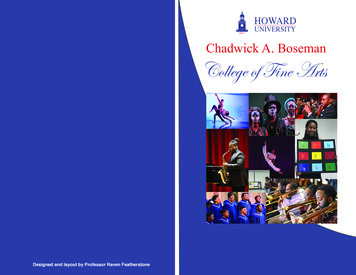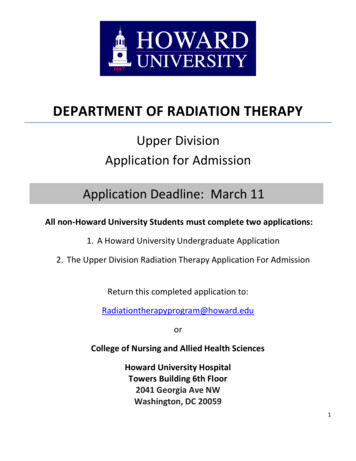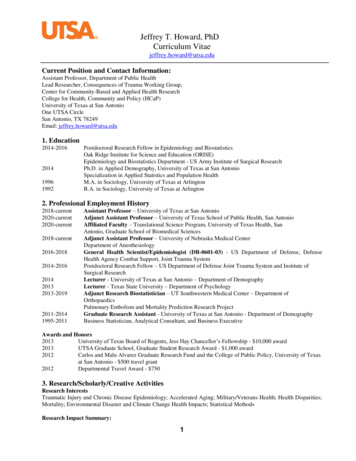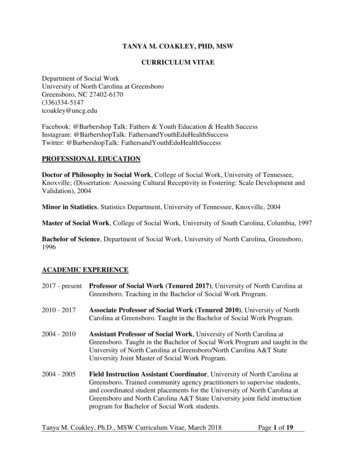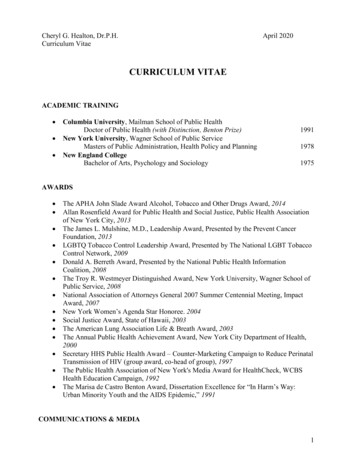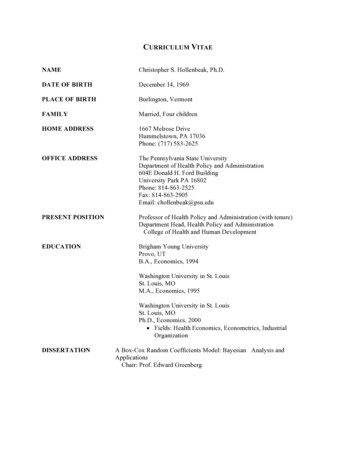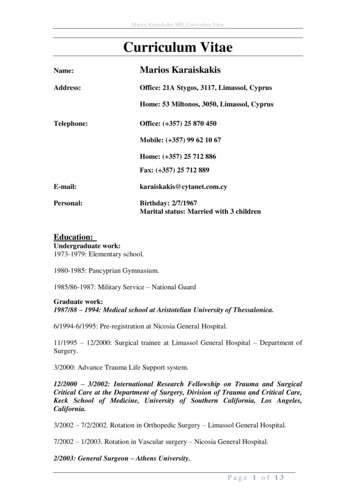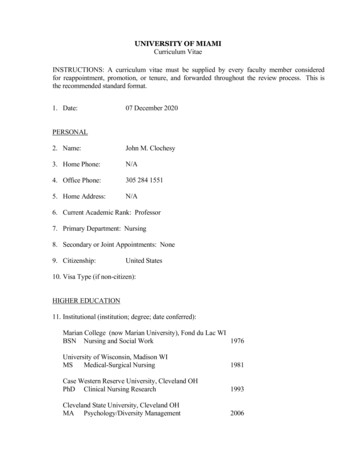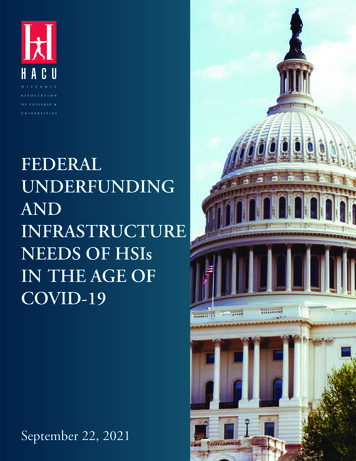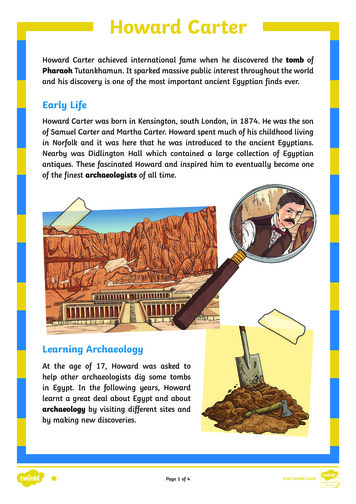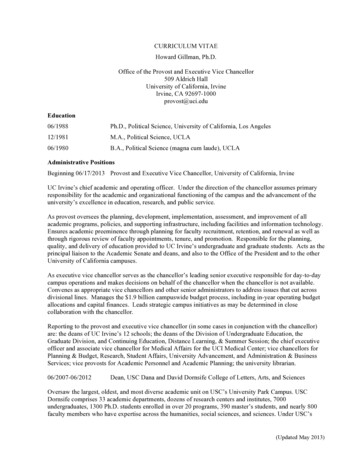
Transcription
CURRICULUM VITAEHoward Gillman, Ph.D.Office of the Provost and Executive Vice Chancellor509 Aldrich HallUniversity of California, IrvineIrvine, CA 92697-1000provost@uci.eduEducation06/1988Ph.D., Political Science, University of California, Los Angeles12/1981M.A., Political Science, UCLA06/1980B.A., Political Science (magna cum laude), UCLAAdministrative PositionsBeginning 06/17/2013 Provost and Executive Vice Chancellor, University of California, IrvineUC Irvine’s chief academic and operating officer. Under the direction of the chancellor assumes primaryresponsibility for the academic and organizational functioning of the campus and the advancement of theuniversity’s excellence in education, research, and public service.As provost oversees the planning, development, implementation, assessment, and improvement of allacademic programs, policies, and supporting infrastructure, including facilities and information technology.Ensures academic preeminence through planning for faculty recruitment, retention, and renewal as well asthrough rigorous review of faculty appointments, tenure, and promotion. Responsible for the planning,quality, and delivery of education provided to UC Irvine’s undergraduate and graduate students. Acts as theprincipal liaison to the Academic Senate and deans, and also to the Office of the President and to the otherUniversity of California campuses.As executive vice chancellor serves as the chancellor’s leading senior executive responsible for day-to-daycampus operations and makes decisions on behalf of the chancellor when the chancellor is not available.Convenes as appropriate vice chancellors and other senior administrators to address issues that cut acrossdivisional lines. Manages the 1.9 billion campuswide budget process, including in-year operating budgetallocations and capital finances. Leads strategic campus initiatives as may be determined in closecollaboration with the chancellor.Reporting to the provost and executive vice chancellor (in some cases in conjunction with the chancellor)are: the deans of UC Irvine’s 12 schools; the deans of the Division of Undergraduate Education, theGraduate Division, and Continuing Education, Distance Learning, & Summer Session; the chief executiveofficer and associate vice chancellor for Medical Affairs for the UCI Medical Center; vice chancellors forPlanning & Budget, Research, Student Affairs, University Advancement, and Administration & BusinessServices; vice provosts for Academic Personnel and Academic Planning; the university librarian.06/2007-06/2012Dean, USC Dana and David Dornsife College of Letters, Arts, and SciencesOversaw the largest, oldest, and most diverse academic unit on USC’s University Park Campus. USCDornsife comprises 33 academic departments, dozens of research centers and institutes, 7000undergraduates, 1300 Ph.D. students enrolled in over 20 programs, 390 master’s students, and nearly 800faculty members who have expertise across the humanities, social sciences, and sciences. Under USC’s(Updated May 2013)
Howard Gillman/Curriculum VitaePage 2system of revenue based management had responsibility for managing a budget of approximately 340million, a staff of over 600, and offices of Advancement/External Relations, Communications, TechnologyServices, Admissions, Advising, Facilities, General Education, Language Instruction, and Overseas Studies(among others).Notable accomplishments include fundraising of approximately 450 million over five years, and a centralrole securing a 200 million naming gift of unrestricted endowment—the largest single gift in the history ofUSC and the largest naming gift in the history of higher education for a research university’s college ofletters, arts and sciences. Credited with promoting innovation in academic programs, securing yearlyincreases in external funding for research (up to approx. 76 million/yr.), recruiting over 100 new faculty,making diversity an institutional priority, developing new funding model for Ph.D. programs, andexpanding undergraduate opportunities to conduct research, study overseas, and engage in service learning(see dornsife.usc.edu/proclamation-howard-gillman). Additional information can be found in a separatedocument, “Accomplishments and Milestones for the College of Letters, Arts and Sciences at USC Duringthe Deanship of Howard Gillman, 2007-2012.”07/2005-05/2007Associate Vice Provost for Research Advancement, USCResponsible for advancing scholarship in the social sciences and humanities across the university.Developed a number of new initiatives, including a university-wide effort to study immigrant integration.Co-led an effort to create USC’s US-China Institute. Co-led a program to provide internal grants forAdvancing Scholarship in the Humanities and Social Sciences. Represented the provost’s office by cochairing the search for the dean of the Annenberg School for Communication and Journalism.08/2004-06/2005Chair, Department of Political Science, USC08/1996-06/2001Director of Graduate Studies, Department of Political Science, USCAcademic Positions06/2013-presentProfessor of Political Science and Law, University of California, Irvine07/2012-06/2013Professor of Political Science, History and Law (Law by courtesy), USC06/2007-06/2012Anna H. Bing Dean’s Chair, USC04/2002-06/2012Professor of Political Science, History, and Law (History and Law by courtesy),University of Southern California09/1995-04/2002Associate Professor of Political Science, USC09/1990-08/1995Assistant Professor of Political Science, USC09/1989-08/1990Assistant Professor of Political Science, California State Polytechnic University,Pomona08/1988-06/1989Visiting Assistant Professor of Political Science, University of California,Riverside08/1986-08/1988Visiting Assistant Professor of Political Science, Pepperdine University, Malibu08/1988-12/1988Adjunct Professor of Political Science, University of California, Los Angeles08/1987-09/1988Adjunct Professor of Political Science, California State University, Los Angeles09/1987-06/1988Adjunct Professor of Political Science, California State University, Northridge1986-1990 (summers) Lecturer, Department of Political Science, UCLA
Howard Gillman/Curriculum Vitae09/1981-06/1984Page 3Teaching Associate/Assistant, Department of Political Science, UCLAAcademic Fields of SpecializationConstitutional law, history, theory, and politics; Supreme Court politics; American political development;judicial politics; law and society; jurisprudence; the new institutionalism.Doctoral dissertation: “The Constitution Besieged: The Founders’ Vision of a Faction-Free Republic, theIntensification of Class Conflict, and Constitutional Ideology During the Lochner Era.”Courses TaughtAmerican Constitutional Development (graduate seminar); American Constitutional Law and Theory(graduate seminar); The Supreme Court (undergraduate lecture and graduate seminar); Law, Politics, andPublic Policy (undergraduate lecture and graduate seminar); The Federal Judiciary; Constitutional Law-Separation of Powers; Constitutional Law--Fundamental Freedoms; Constitutional Law--Rights of theAccused; The Criminal Justice System; Jurisprudence; History of the Anglo-American Legal System;Watergate, the Iran-Contra Affair, and Constitutional Democracy (senior seminar); The Founding of theAmerican Constitution (senior seminar); Theories of Constitutional Interpretation (senior honors seminar);Law in Film; Introduction to American Politics; Contemporary Issues in American Politics (senior honorsseminar); The American Presidency; Change and the Future (freshman honors general education); ModernTimes (an interdisciplinary general education course); Marxism and Pragmatism (graduate seminar).Teaching Awards and RecognitionsTeaching and Mentoring Award, Law and Courts Section of the American Political Science Association,recognizing innovative teaching and instructional methods and materials, 2013.USC Associates Award for Excellence in Teaching, 2001—the highest honor the university bestows on itsfaculty for career achievement in teaching and dedication to students; up to two awards are presentedyearly.General Education Teaching Award, College of Letters, Arts and Sciences, USC, 2001—presented by thedean’s office for contributions to the General Education Program during the preceding year.Distinguished Faculty Fellow, USC’s Center for Excellence in Teaching, 2001-2013.Grant recipient, Provost Innovative Undergraduate Teaching Award, “Enhancing Collaborative Learning inUndergraduate Courses Through the Development of Moot Court Simulations,” 2000-2001 academic year.Recipient, Hewlett Grant, for innovative course development relating to a revised General Educationcurriculum, USC, 1995.Award presented by the faculty of the Department of Political Science, USC, for “Outstanding ClassroomTeaching and Dedication to Students, 1993-1994.”Award presented by the faculty of the Department of Political Science, USC, for “Outstanding ClassroomTeaching and Dedication to Students, 1992-1993.”Faculty of the Month, November 1991, presented by the Mortar Board Senior Honor Society, USC chapter.Teaching Associate of the Year, 1983-1984, a university-wide award presented by UCLA’s AcademicSenate.Teaching Assistant of the Year, 1982-1983, a departmental award presented by the Undergraduate PoliticalScience Honors Society.Teaching Assistant of the Year, 1981-1982, a departmental award presented by the Undergraduate PoliticalScience Honors Society.
Howard Gillman/Curriculum VitaePage 4Other Academic Awards and RecognitionsLaw and Courts Service Award, recognizing exceptional service to the Law and Courts Section of theAmerican Political Science Association, September 2012.Enlund Distinguished Scholar in Residence, Depaul University College of Law, April 6, 2006.American Judicature Society Award for best paper on public law presented the previous year at a nationalor regional political science meeting, Law and Courts Section of the American Political ScienceAssociation, August 2001.C. Herman Pritchett Award for best book in public law published during the previous year, presented by theLaw and Courts section of the American Political Science Association, for The Constitution Besieged,1994.The Constitution Besieged named by Choice as an “Outstanding Academic Book” selection for 1993.1992 Pi Sigma Alpha award “for the best paper presented at the last annual meeting of the Western PoliticalScience Association.”1988 Pi Sigma Alpha award “for the best paper presented at the last annual meeting of the Western PoliticalScience Association.”Research Fellowship, Department of Political Science, UCLA, 1986.Chancellor’s Dissertation Fellowship, 1984.Department Fellowship, Political Science Department, UCLA, 1980.Phi Beta Kappa, 1980.BooksAmerican Constitutionalism: The Unabridged Reference Edition, co-authored with Mark A. Graber andKeith E. Whittington. Proposal solicited and currently under review by the Academic Law Division ofOxford University Press (project length estimated at 4-5 million words, with publication expected in 2015).American Constitutionalism: Abridged Edition, co-authored with Mark A. Graber and Keith E.Whittington. Under contract with Oxford University Press (expected date of publication 2014).American Constitutionalism: Volume I: Structures of Government, co-authored with Mark A. Graber andKeith E. Whittington. New York and Oxford: Oxford University Press, 2012 (773pp.).American Constitutionalism: Volume II: Rights & Liberties, co-authored with Mark A. Graber and KeithE. Whittington. New York and Oxford: Oxford University Press, 2012 (expected publication inNovember) (1024pp.).The Votes that Counted: How the Court Decided the 2000 Presidential Election. Chicago and London:University of Chicago Press, 2001.Supreme Court Decision-Making: New Institutionalist Approaches, edited with Cornell W. Clayton.Chicago and London: University of Chicago Press, 1999.The Supreme Court in American Politics: New Institutionalist Interpretations, edited with Cornell W.Clayton. Lawrence, KS: University Press of Kansas, 1999.The Constitution Besieged: The Rise and Demise of Lochner Era Police Powers Jurisprudence. Durhamand London: Duke University Press, 1993. Received the C. Herman Pritchett Award for best book inpublic law published during the previous year, presented by the Law and Courts section of the AmericanPolitical Science Association. Also a Choice “Outstanding Academic Book” selection for 1993.
Howard Gillman/Curriculum VitaePage 5Articles in Refereed Journals and Law Reviews“Regime Politics, Jurisprudential Regimes, and Unenumerated Rights,” University of Pennsylvania Journalof Constitutional Law (October 2006), 107-119.“De-Lochnerizing Lochner,” Boston University Law Review 85 (June 2005):859-865.“Disaster Relief, ‘Do Anything’ Spending Powers, and the New Deal,” Law and History Review 23(Summer 2005), 443-450.“Martin Shapiro and the New Institutionalism in Judicial Behavior Studies,” Annual Review of PoliticalScience, Vol. 7, edited by Nelson W. Polsby (Portland: Annual Reviews, 2004).“Judicial Independence Through the Lens of Bush v. Gore: Four Lessons from Political Science,” OhioState Law Journal 64 (2003), 249. Reprinted in Inside the Judicial Process, eds. Gregg Ivers and JenniferA. Segal (New York: Houghton Mifflin, 2006) and Princeton Readings in American Politics, ed. RichardM. Valelly (Princeton University Press, 2009).“How Political Parties Can Use the Courts to Advance Their Agendas: Federal Courts in the United States,1875-1891,” American Political Science Review 96 (2002):511-524. Reprinted in Institutions and PublicLaw: Comparative Approaches, eds. Tom Ginsburg and Robert Kagan (New York: Peter Lang, 2005).“What’s Law Got to Do With It? Judicial Behavioralists Test the ‘Legal Model’ of Judicial DecisionMaking,” review essay, focusing on Harold J. Spaeth and Jeffrey A. Segal, Majority Rule or Minority Will(Cambridge: Cambridge University Press, 1999), Law and Social Inquiry 26 (2001):465-504.“From Fundamental Law to Constitutional Politics -- and Back,” review essay, focusing on Stephen M.Griffin’s American Constitutionalism: From Theory to Politics (Princeton: Princeton University Press,1996), Law and Social Inquiry (1998):185-202.“The Collapse of Constitutional Originalism and the Rise of the Notion of the ‘Living Constitution’ in theCourse of American State-Building,” Studies in American Political Development 11 (Fall 1997):191-247.“The Antinomy of Public Purposes and Private Rights in the American Constitutional Tradition, or WhyCommunitarianism is Not Necessarily Exogenous to Liberal Constitutionalism,” Law and Social Inquiry 21(Winter 1996):67-77.“More on the Origins of the Fuller Court’s Jurisprudence: The Scope of Federal Power Over Commerceand Manufacturing in Nineteenth-Century Constitutional Law,” Political Research Quarterly 49 (June1996):415-437.“On Constructing a Science of Comparative Judicial Politics: Comment on Tate and Haynie’s‘Authoritarianism and the Functions of Courts’,” Law and Society Review 28 (1994):901-922.“Preferred Freedoms: The Progressive Expansion of State Power, and the Rise of Modern Civil LibertiesJurisprudence,” Political Research Quarterly 47 (September 1994):623-653.“The Struggle Over Marshall and the Politics of Constitutional History,” Political Research Quarterly 47(December 1994):877-887.“The Constitution Besieged: TR, Taft, and Wilson on the Virtue and Efficacy of a Faction-Free Republic,”Presidential Studies Quarterly 19 (1989):179-201.Book Chapters“Courts and the Politics of Partisan Coalitions,” in The Oxford Handbook of Law and Politics, eds. KeithWhittington, R. Daniel Keleman, and Gregory A. Caldiera, pp.644-658. Oxford University Press, 2008.
Howard Gillman/Curriculum VitaePage 6“Party Politics and Constitutional Change: The Political Origins of Liberal Judicial Activism,” in TheSupreme Court and American Political Development, eds. Ken Kersch and Ronald Kahn, pp.138-168.Lawrence, KS: The University Press of Kansas, 2006.“The Waite Court, 1874-1888: The Collapse of Reconstruction and the Transition to ConservativeConstitutionalism,” in The United States Supreme Court: The Pursuit of Justice, ed. Christopher L.Tomlins, pp.124-146. New York: Houghton Mifflin, 2005.“Constitutional Law as Hardball Politics: Bush v. Gore (2000),” in Creating Constitutional Change:Clashes over Power and Liberty in the Supreme Court, eds. Gregg Ivers and Kevin T. McGuire, pp.49-63.Charlottesville and London: University of Virginia Press, 2004.“Robert G. McCloskey, Historical Institutionalism, and the Arts of Judicial Governance,” in Pioneers ofPublic Law, edited by Nancy Maveety, pp.336-360. Ann Arbor: University of Michigan Press, 2003.“Reconnecting the Modern Supreme Court to the Historical Evolution of American Capitalism,” in TheSupreme Court in American Politics: New Institutionalist Interpretations, eds. Howard Gillman andCornell W. Clayton, pp.235-256. Lawrence, KS: University Press of Kansas, 1999.“Introduction,” with Cornell W. Clayton, in The Supreme Court in American Politics: New InstitutionalistInterpretations, eds. Howard Gillman and Cornell W. Clayton, pp.1-12. Lawrence, KS: University Pressof Kansas, 1999.“The Court is an Idea, Not a Building (or a Game): Interpretive Institutionalism and the Analysis ofSupreme Court Decision-Making,” in Supreme Court Decision-Making: New Institutionalist Approaches,eds. Cornell W. Clayton and Howard Gillman, pp.65-87. Chicago and London: University of ChicagoPress, 1999.“Beyond Judicial Attitudes: Institutional Approaches to Supreme Court Decision-Making,” with CornellW. Clayton, in Institutional Approaches to Supreme Court Decision-Making, eds. Cornell W. Clayton andHoward Gillman, pp.1-12. Chicago and London: University of Chicago Press, 1999.Articles in Non-Refereed Journals“Political Development and the Origins of the ‘Living Constitution’,” Advance, a semi-annual publicationof the American Constitution Society (Fall 2007).“First Amendment Doctrine as Regime Politics,” The Good Society14 (2005): 59-61.“Separating the Wheat from the Chaff in The Supreme Court and the Attitudinal Model Revisited,” Law andCourts (Newsletter of the Law and Courts Section of the American Political Science Association) 13(Summer 2003):12-18.“Conceptual Chasm or Semantic Imprecision? Are Disagreements between Attitudinalists andInstitutionalists Distinctions Without a Difference?,” (co-authored with Harold Spaeth), in Law and Courts(Newsletter of the Law and Courts Section of the American Political Science Association) 11 (Winter2001):7-12.“A Friendly Rejoinder from a Historical Institutionalist to a Behavioralist,” in Law and Courts (Newsletterof the Law and Courts Section of the American Political Science Association) 10 (Summer 2001):18.“How to Succeed in Public Law” (co-authored with Mark Graber), in Law and Courts (Newsletter of theLaw and Courts Section of the American Political Science Association) 9 (Winter 1999):15-17.“Some Scattered Observations About Applying Historical Institutionalism to the Study of Law and Courts,”part of a Symposium on Courts, Law, and the New (Historical) Institutionalism, in Law and Courts(Newsletter of the Law and Courts Section of the American Political Science Association) 9 (Spring1999):9-11.
Howard Gillman/Curriculum VitaePage 7“Placing Judicial Motives in Context,” Law and Courts (Newsletter of the Law and Courts Section of theAmerican Political Science Association) 7 (Spring 1997):10-13.“More and Less Than Strategy: Some Advantages to Interpretive Institutionalism in the Analysis ofJudicial Politics,” Law and Courts (Newsletter of the Law and Courts Section of the American PoliticalScience Association) 7 (Winter 1996-1997):6-11.“Sociological Jurisprudence Revisited, or Why Facts Can’t Serve as Foundations for ConstitutionalTheory,” Law and Courts (Newsletter of the Law and Courts Section of the American Political ScienceAssociation) 5 (Summer 1995):7-9.Book ReviewsReview of Michael J. Klarman’s From Jim Crow to Civil Rights: The Supreme Court and the Struggle forRacial Equality (Oxford and New York: Oxford University Press, 2004), for H-Law (Dec. 2004), availableat http://www.h-net.org/reviews/showrev.cgi?path 110861109954664.Review of Jamin B. Raskin’s Overruling Democracy: The Supreme Court vs. the American People (NewYork: Routledge, 2003), for Political Science Quarterly 119 (Spring 2004):210-11.Review of Howard Ball’s The Supreme Court in the Intimate Lives of Americans: Birth, Sex, Marriage,Childrearing, and Death (New York and London: New York University Press, 2002), for Perspectives OnPolitics 1 (Sept. 2003):600.Review of Michael J. Phillips’s The Lochner Court, Myth and Reality: Substantive Due Process from the1890s to the 1930s (Westport, CT: Praeger Publishers, 2001), for The Law and Politics Book Review 11(April 2001):165-169.Review of David A. Black’s Law in Film: Resonance and Representation (Urbana and Chicago:University of Illinois Press, 1999), for The Law and Politics Book Review 10 (September 2000):514-516.Review of Richard A. Primus’ The American Language of Rights (Cambridge and New York: CambridgeUniversity Press, 1999), in the American Political Science Review 94 (Sept. 2000):712.Review of Barry Cushman’s Rethinking the New Deal Court: The Structure of a Constitutional Revolution(New York: Oxford University Press, 1998), in the American Political Science Review 93 (March1999):207-208.Review of Richard A. Brisbin, Jr.’s Justice Antonin Scalia and the Conservative Revival (Baltimore andLondon: The Johns Hopkins University Press, 1997), in The Journal of Politics 60 (August 1998):884-886.Review of Paul Kens’ Justice Stephen Field: Shaping American Liberty From the Gold Rush to the GildedAge (Lawrence, KS: University Press of Kansas, 1997), in The Law and Politics Book Review 7 (November1997):511-516.Review of Rudolph J.R. Peritz’s Competition Policy in America, 1888-1992: History, Rhetoric, Law (NewYork and Oxford: Oxford University Press, 1996), in The American Journal of Legal History.Review of Scott Douglas Gerber’s To Secure These Rights: The Declaration of Independence andConstitutional Interpretation (New York: New York University Press, 1995), in Law and History Review16 (Summer 1998):424-426.Review of William Gangi’s Saving the Constitution from the Courts (Norman, OK: University ofOklahoma Press, 1995), in Political Science Quarterly 111 (Winter 1997):720-721.Review of Roberta Kevelson’s (ed.) Law and the Conflict of Ideologies: Ninth Round Table on Law andSemiotics (New York: Peter Lang, 1996), in The Law and Politics Book Review 7 (July 1997):330-332.
Howard Gillman/Curriculum VitaePage 8Review of William G. Ross’ A Muted Fury: Populists, Progressives, and Labor Unions Confront theCourts, 1890-1937 (Princeton: Princeton University Press, 1994), in The Journal of InterdisciplinaryHistory 26 (Spring 1996):736-37.Review of Martin H. Redish’s The Constitution as Political Structure (New York and Oxford: OxfordUniversity Press, 1995), in The Annals of the American Academy of Political and Social Science 544(March 1996):226-27.Review of James W. Ely, Jr.’s The Chief Justiceship of Melville W. Fuller, 1888-1910 (Columbia, S.C.:University of South Carolina Press, 1995), in The Journal of American History 82 (Dec. 1995):1243-44.“American Labor versus American Capital before the Civil War,” review of Tony A. Freyer’s Producersversus Capitalists: Constitutional Conflict in Antebellum America (Charlottesville and London: UniversityPress of Virginia, 1994) and Christopher Tomlins’ Law, Labor, and Ideology in the Early AmericanRepublic (Cambridge and New York: Cambridge University Press, 1993), Legal Studies Forum 18(1995):369-377.Review of David Kairys’ (ed.) The Politics of Law: A Progressive Critique, revised edition (New York:Pantheon Books, 1982, 1990), in The Law and Politics Book Review 5 (Feb. 1995):36-41.Review of John Phillip Reid’s Constitutional History of the American Revolution: The Authority toLegislate, Volume 3 (Madison: University of Wisconsin Press, 1991), forthcoming in The Annals of theAmerican Academy of Political and Social Science 536 (Nov. 1994):180-181.Review of Paul W. Kahn’s Legitimacy and History: Self-Government in American Constitutional Theory(New Haven & London, Yale University Press, 1992) in Social Science Quarterly 75 (March 1994):232233.Review of Steven A. Shull’s A Kinder, Gentler Racism? The Reagan-Bush Civil Rights Legacy (Armonkand London: M.E. Sharpe, 1993) in The Law and Politics Book Review 4 (Jan. 1994):10-12.Review of Michael L. Lacey and Knud Haakonssen, eds., A Culture of Rights: The Bill of Rights inPhilosophy, Politics, and Law--1791 and 1991 (Cambridge and New York: Woodrow Wilson InternationalCenter for Scholars and Cambridge University Press, 1991) in Legal Studies Forum 17 (1993):201-204.Encyclopedia Entries“Stephen J. Field,” in The Yale Biographical Dictionary of American Law, ed. Roger K. Newman. NewHaven: Yale University Press, 2009.“Bush v. Gore,” The Oxford Companion to American Law, eds. Kermit L. Hall, David S. Clark, James W.Ely, Joel B. Grossman. New York and Oxford: Oxford University Press, 2002.“The Living Constitution,” in The Encyclopedia of the American Constitution: Supplement II, eds. LeonardW. Levy, Kenneth L. Karst, and Adam Winkler. New York: Macmillan Publishing, 2000.“Judicial Review in the Nineteenth Century,” The Constitution and Its Amendments, ed. Roger K. Newman.New York: Macmillan Publishing, 1999.Publications Related to Consulting(Contributing editor), With Liberty and Justice for All: The Story of the Bill of Rights (Calabasas: Centerfor Civic Education, 1991), co-sponsored by the Commission on the Bicentennial of the Constitution; othercontributors included Calvin Jillson, Thomas Pangle, Melvin Urofsky, and Donald Nieman. Wrote the firstdetailed outline of the text and wrote the chapters associated with the unit on the First Amendment.(Contributing editor), Introduction to the Constitution of the United States of America (Calabasas: Centerfor Civic Education, 1986), co-sponsored by the Commission on the Bicentennial of the U.S. Constitution.Outlined the text and wrote the first draft.
Howard Gillman/Curriculum VitaePage 9Other ConsultingOne Nation, Under Law: The Story of the Supreme Court (NEH 2003), PBS documentary, produced byThirteen/WNET New York, aired January 2007 (featured on-air commentator).Academic Conference Papers and Presentations“Integrating Politics and History into the Teaching of Constitutional Law,” annual meeting of the AmericanPolitical Science Association, New Orleans, LA, August 30-September 2, 2012 (conference canceled due toHurricane Issac).“Rethinking the Teaching of American Constitutionalism,” annual meeting of the Midwest Political ScienceAssociation, Chicago, IL, April 12-15, 2012.“Unenumerated Rights and American Political Development,” annual meeting of the Western PoliticalScience Association, Albuquerque, NM, March 16-18, 2006.“Elements of a New ‘Regime Politics’ Approach to the Study of Judicial Politics,” annual meeting of theAmerican Political Science Association, Chicago, IL, September 2-5, 2004.“Courts Are More Interesting Than We Think: Elements of a New ‘Regime Politics’ Tradition in PublicLaw Scholarship,” annual meeting of the Western Political Science Association, Portland, OR, March 1114, 2004.Chair, panel on “What Does the Recall Mean for Policy in California?,” Post Mortem on the Recall,Conference Sponsored by the Jesse M. Unruh Institute of Politics, the Annenberg School forCommunication at USC, the USC/Caltech Center for the Study of Law and Politics, the Initiative andReferendum Institute, the League of Women Voters of Los Angeles, and the California Center forEducation in Public Affairs, Nov. 13-14, 2003, USC.Participant, Authors Meet Critics Roundtable on Spaeth and Segal’s The Supreme Court and the AttitudinalModel Revisited, annual meeting of the Midwest Political Science Association, April 2-5, 2003, Chicago,IL.“Judicial Politics as Political Entrenchment: Congressional Democrats and Judicial ‘Activism’ in the 1960sand 1970s,” annual meeting of the Western Political Science Association, Denver, CO, March 27-29, 2003.Participant, roundtable on teaching effectiveness, annual meeting of the Western Political ScienceAssociation, Denver, CO, March 27-29, 2003.Discussant, panel on Judicial Appointments and Confirmations, annual meeting of the Western PoliticalScience Association, Denver, CO, March 27-29, 2003.“Constitutional History as Political History Rather than Doctrinal History: Perspectives from the LochnerEra,” prepared for a conference on Constitutional Law co-sponsored by the Association of American LawSchools and the American Political Science Association, Washington, D.C., June 2002.“Judicial Independence Through the Lens of Bush v. Gore.” Paper presented at a conference entitled“Perspectives on Judicial Independence,” co-sponsored by the Michael E. Moritz College of Law, the JohnGlenn Institute for Public Service and Public Policy, and the League of Women Voters of Ohio EducationFund, Ohio State University, March 21-22, 2002.“The Idea of Constitutional Politics.” Remarks prepared as part of an “author meets readers” roundtable onDouglas R. Reed’s On Equal Terms, annual meeting of the Western Political Science Association, LongBeach, CA, March 23, 2002.“Judicial Politics in the Context of Political Development.” Remarks prepared as part of a roundtable on“Public Law and Political Development,” annual meeting of the Western Political Science Association,Long Beach, CA, March 23, 2002.
Howard Gillman/Curriculum VitaePage 10“Bush v. Gore.” Remarks prepared as part of a roundtable on Bush v. Gore at the annual meeting of theWestern Political Science Association, Las Vegas, Nevada, March 2001.“Bush v. Gore and Political Science Theor
Howard Gillman/Curriculum Vitae Page 5 Articles in Refereed Journals and Law Reviews "Regime Politics, Jurisprudential Regimes, and Unenumerated Rights," University of Pennsylvania Journal of Constitutional Law (October 2006), 107-119. "De-Lochnerizing Lochner," Boston University Law Review 85 (June 2005):859-865. "Disaster Relief, 'Do Anything' Spending Powers, and the New Deal .
